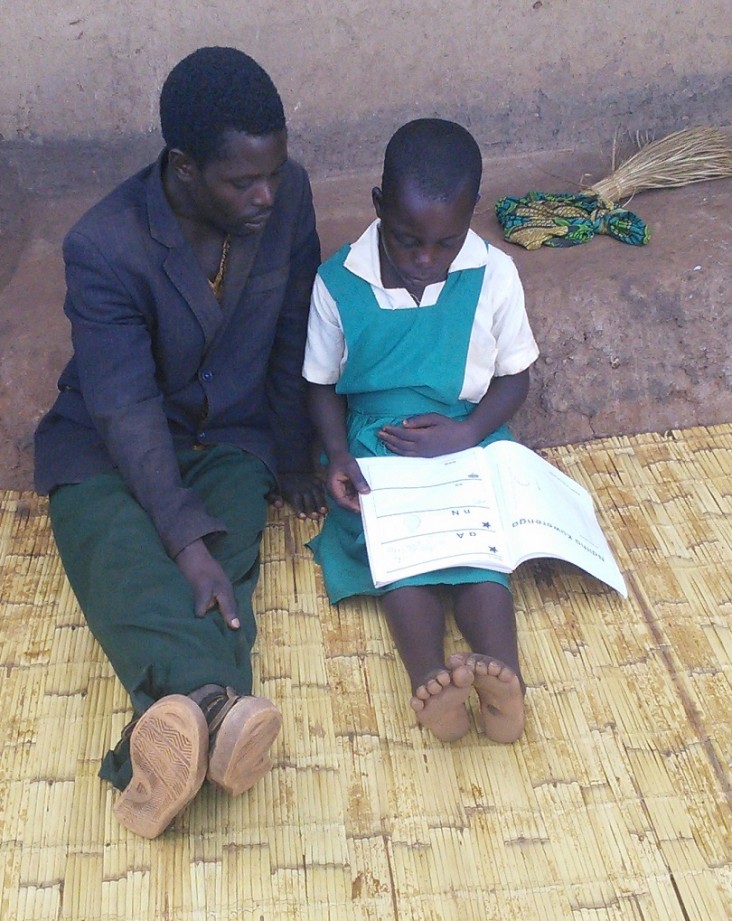
March 2015—Seven-year-old Bridget Mandalai stood quietly next to her father, Hardwick, waiting patiently as a long line of people trailed behind them. The rainy season was over but winter’s coolness was still far off, and green grass was yielding to the ubiquitous red dust that defines Malawi’s dry season. To pass the time, Bridget bent down, picked up a stick, and started making shapes in a patch of dirt. The shapes turned into letters that turned into words, and her father watched with amazement.
Hardwick sent Bridget, like her siblings before her, to Pamela Ndaziona’s Standard (Grade) 1 at the Makanda School in the Ntchisi School District because, although illiterate himself, he believed that going to school was an important part of growing up. However, unlike her siblings, Bridget brought home reading materials and showed her father that she could read the words in the books. He was amazed. His other children did not start reading until at least Standard 3. He could not remember them ever bringing home reading materials.
Bridget’s entire Standard 1 experience was different from her siblings. Just before the beginning of the school year, Ndaziona was trained through the USAID Early Grade Reading Activity (EGRA) to deliver high-quality reading instruction to her Standard 1 students. She received materials to aid in reading instruction, had coaching visits to help her refine her technique, and attended two week-long training courses on the best ways to teach reading. Most importantly, Ndaziona applied this training to the constantly shifting population of 125 students enrolled in her class.
“Are you really reading those words?” Hardwick asked Bridget.
“Yes, father,” she said, “Look I will show you.” And she began to show her father, just like she had been taught by Ndaziona earlier that day.
Thus started a new father-daughter ritual. Every evening, as the sun slowly dropped below the horizon, Bridget would share that day’s school lesson with her father. She showed him how symbols make sounds. Then, they would take a stick and write the symbols in the dirt. Slowly but steadily, Hardwick memorized the symbols and began turning them into letters, sounds and words ... and … he … too … sl-ow-ly … be-g-an … to … READ!
Many months and lessons later, Hardwick stood in line to register to vote in Malawi’s 2014 tripartite elections, carefully decoding the words that his daughter was forming in the soil. His neighbor nudged him, saying, “You’re next.” He strode up to the registrar and stated his name, glancing at the purple thumbprint smudges that prevailed in the column marked “signature.”
The registrar turned the book and said, “Make your mark here,” holding out the ink pad for Hardwick’s thumb.
“No, thank you,” Hardwick replied, “I can read and write.”
To the amazement of his friends and neighbors, he picked up the seldom-used pen and, for the first time in his life, signed his name to an official document. He beamed as he heard astonished murmurs flutter down the queue. Then he took his daughter’s hand in his ink-free fingers and, both smiling broadly, began the long walk back to the village.
The USAID Early Grade Reading Activity is a three-year, $24 million program implemented by RTI International in August 2013. It promotes quality early grade reading instruction, the production of high-quality reading and learning materials in Chichewa and English, improved policy for reading at the national and local levels, and building a community of reading within and outside the school setting.
An evaluation is currently underway to measure the impact of this intervention and how household factors and other activities of the USAID Malawi mission affect reading scores in participating schools.
LINKS
Follow @USAIDMalawi, on Facebook, on Flickr







Comment
Make a general inquiry or suggest an improvement.